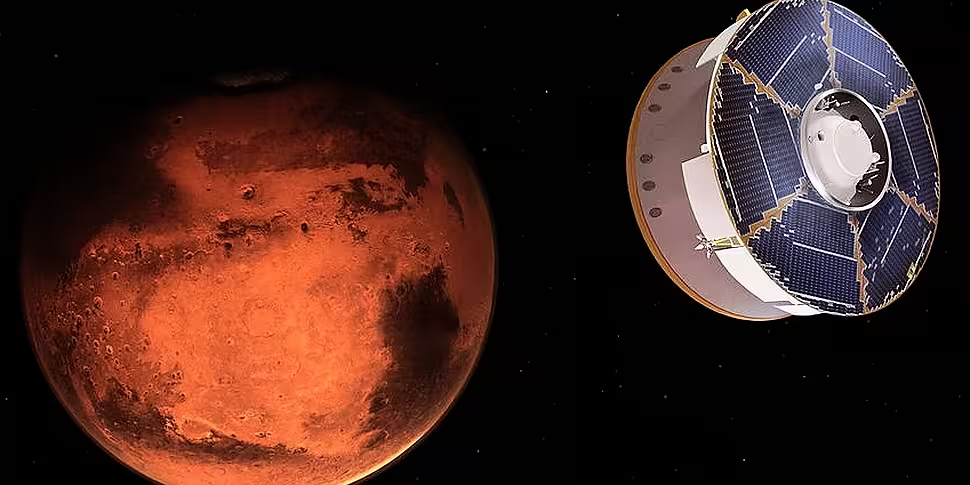A human mission could be boldly going to Mars within the next 15 to 20 years.
That's according to Michael G Hess, Deputy Director of the NASA Office of JPL Management and Oversight.
He told The Hard Shoulder as technology moves forward so do expectations.
"Now that technology is improving, we're continuing to send better and better space probes and robots to go investigate the outer planets and solar system," he said.
"We've got two nuclear rovers on Mars, and a helicopter, that are looking for life.
"Drilling into the Martian soil looking for signs of life - haven't found any yet, but we've got some samples that will be coming back to Earth".
 The Hard Shoulder host Kieran Cuddihy with NASA Deputy Director Michael G Hess in Newstalk studios. Picture by: Newstalk
The Hard Shoulder host Kieran Cuddihy with NASA Deputy Director Michael G Hess in Newstalk studios. Picture by: NewstalkMr Hess said further missions to the Moon are also planned.
"We are going back to the Moon," he said.
"We're working with some of the partners like Blue Origin and SpaceX [who] are going to be providing landers for that system.
"We'll be building a small space station around the Moon, with the ultimate goal of returning to the Moon and building a base - and building up that base to do science.
"Once we have a base established on the Moon, we want to test it all out before we go to Mars.
"We want to make sure the life support system is going to work effectively... we're going to learn on the Moon and then we'll move on to Mars.
"[We'll] basically update the technology but re-use the same sorts of designs to go to Mars".
Heading for Mars
Mr Hess said a manned Mars mission could happen within the next two decades.
"I would think, perhaps, in the next 15 to 20 years - it'll very much depend on how things go on the Moon," he said.
"There's a value of the Moon in and of itself.
"We only have samples from six small locations on the Moon; there's a lot of geology that could help us learn about how did the Moon form?
"How are these lava tubes? What's in the dark craters on the poles, is there ice there? Is there ice that we can then use and make breathing gas, water to drink, rocket fuel?
"Just learn about the Moon... there's a lot of great science that can be done there as well, in addition to the exploration with humans".
'Two-year journey'
Mr Hess said any manned mission to Mars has no quick return option.
"If you launch at the right window it could be a six month trip to Mars - that's zero-G," he said.
"Then you have to go down a gravity well and land on the planet.
"Then you have a choice: you're either going to stay there a short while - like a month - and then you have a year to 18 months back home, or you stay for a year on the surface and then you have six more months back home.
"So you're kind of committed to a two-year journey when you leave, and there's no quick rescue.
"With the Space Station folks if there's a problem, they could get in an emergency vehicle and come home.
"From the Moon you're home in three days; from Mars, you're kind of committed to a couple of return windows that are months/years away," he added.
Listen back to the full interview below:
Main image: Illustration shows NASA's Mars 2020 spacecraft carrying the Perseverance rover as it approaches Mars in February 2021. Picture by: NASA/JPL-Caltech









